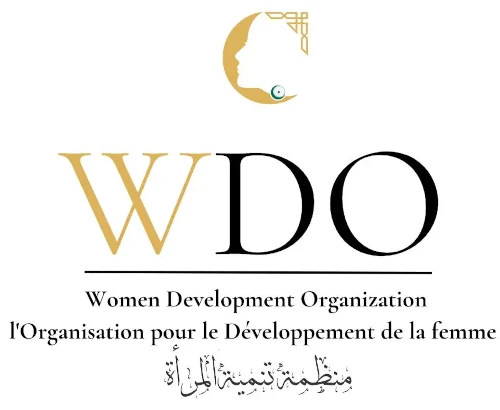The event aimed to inform Member States and development partners on the newly established WDO and engage in an open exchange on thematic orientation and the organization’s strategic priorities. Furthermore, the meeting explored ideas about the WDO Multi-Partner Trust Fund (MPTF) and possibilities for funding opportunities within the proposed workstreams of the MPTF. More than 30 official representatives of the international community in Cairo participated, including Embassies, Missions of OIC and non-OIC Member States accredited in Cairo, as well as offices of development partners.
Ambassador Ehab Fawzy the Deputy Executive Director of the WDO gave an informative presentation. He emphasized that the WDO will be the center of gender architecture of the OIC system. He outlined the first programmatic cycle of the WDO and the linkage between its components and the MPTF four pillars which are; Promoting Women’s Economic Empowerment & Financial Inclusion, Elimination of Violence and harmful practices against women and girls, Women’s leadership in promoting peaceful and inclusive societies, Role of women in fighting corruption.
Dr. Maya Morsy, the President of the National Council for Women and the Chair of the First Ministerial Council of WDO, reaffirmed the importance of the WDO and its establishment within the OIC system as it was the case with the establishment of UN Women within the UN system. Dr. Morsy gave a background about the history of the establishment of WDO which started since 2005 and the adoption of its statute in 2010 and entering into force in 2020. She confirmed that Egypt spared no effort to support the Organization and its establishment since 2005. She added that these efforts were culminated with the decision of the Egyptian government to pay the annual share of the WDO budget for least developed member states.
The second part of the event included technical presentations on the four thematic pillars of the WDO and the policy papers which were developed for them by UN Women, UNODC, and independent institutions such as Siracusa International Institute for Criminal Justice and Human Rights, in addition to the IsDB that presented its perspective about cooperation with WDO. The coordinator of the MPTF Office participated virtually from New York to explain the standard procedures of establishing the MPTF and the different types of MPTFs.
The discussions on establishing an MPTF is one of the proposed modalities to advance strategic partnerships of WDO and integrate it within the international community in accordance with the objectives of its statute and its mandate underlined in OIC ministerial resolutions.



